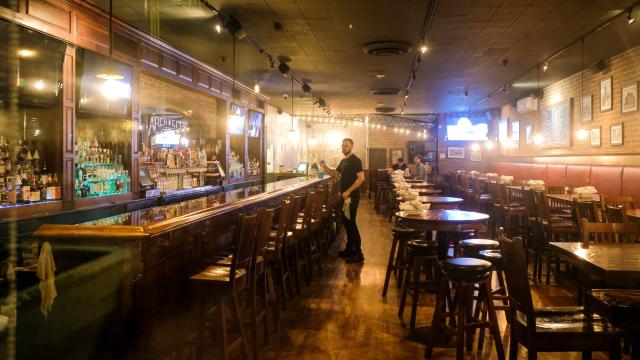Are you afraid of going to work during a global pandemic that’s sickened over 1.25 million Americans and killed more than 75,000? Fuck you. At least that’s the message from state officials in Ohio, where roughly 1,200 U.S. workers have been “turned in” by their employers for staying home. And states like Pennsylvania, Texas, and South Carolina could soon follow Ohio’s lead.
The Ohio Department of Job and Family Services recently launched a website that allows employers to report any employees who don’t come to work during the ongoing pandemic, as the state allowed many businesses to reopen this week. The government agency refers to it as “Covid-19 Fraud” if a worker refuses to come in over fears for their health when a job is available, arguably one of the most Orwellian terms of our era.
About 1,200 workers have been reported to state authorities by 600 employers so far, according to the Washington Post, which means that those people could be stripped of their unemployment benefits. Many employers seem fearful that their workers are making more money from staying at home than they would be paid while working. And the state is more than happy to force those workers back into low wage jobs.
As the Ohio website explains: “Employers may use the following form to report employees who quit or refuse work when it is available due to COVID-19.” Yes, you read that correctly. You’re not allowed to even quit your job in Ohio.
“It’s a case-by-case basis, but if you’re just saying ‘I’m afraid of the virus,’ that would not be sufficient,” Kimberly Hall, the director of Ohio’s Department of Job and Family Services, told reporters in Ohio earlier this week. Hall did not respond to an email from Gizmodo on Friday morning.
Ohio has currently identified at least 22,131 cases of coronavirus and 1,271 deaths from the disease, according to the Ohio Department of Public Health. And even Governor Mike DeWine, a Republican, acknowledges that the risk for widespread infection is still high, despite his recent decision to start reopening businesses in the state after locking down large parts of the economy on March 15.
“As we open up the economy, let me just state the obvious and not shy away from it. The risk is up,” DeWine said at a press conference on Thursday. “The more contacts we have, the more that we do, the more risk there is. That we can expect.”
Manufacturing plants and office work was allowed to reopen in the state on May 4. Ohio will allow retail stores to reopen on May 12, and restaurants can reopen on May 21, provided there is six feet of distance between tables and that servers wear masks.
Millions of Americans have lost their jobs and the unemployment rate is currently 14.7 per cent, according to the latest figures released this morning. And that’s likely a dramatic undercount of the real unemployment rate since the sample data used by the U.S. government is from mid-April.
People are hurting economically, but many Americans are being given a binary choice between their health and their paycheck, something that other countries have not forced upon their citizens. Many other countries have started to slowly reopen their economies this month, but that’s because they properly tested their populations for the disease (like Germany, New Zealand, and South Korea) and have no need for websites where employers can snitch on their workers.
Sadly, Ohio isn’t the only state engaging in this dystopian game of allowing business owners more rights than they ever should have over their workers.
From the Washington Post:
A growing roster of states has started issuing ultimatums to their residents, telling them to accept their old posts, if they’re re-offered the opportunity, or risk losing unemployment aid altogether. The threats have been most pointed in Republican-led states, where worries persist that people are trying to avoid work for as long as they can.
Alabama, for example, has publicly warned people that they could be committing fraud if they don’t return to jobs they’ve been re-offered. Oklahoma officials publicly mused about cutting benefits to force residents back to work. Iowa now has a tip line for employers to report those dodging employment. A slew of additional states, including Pennsylvania, Texas, Tennessee and South Carolina, have articulated a wide array of similar policies in recent days.
“Reopening” the economy has become a partisan issue in the U.S., with more Republicans than Democrats insisting that business as usual needs to get going as quickly as possible. Republicans insist that the business closures aren’t worth the number of lives saved and that it’s more important to reopen the economy. But it’s not so clearly an either/or issue.
Sweden, for example, has not implemented strict measures to close businesses, instead opting for a “herd immunity” goal that seems to completely misunderstand what herd immunity actually means. But the wisdom of Sweden’s approach aside, the country does serve as a good example for what happens when you just leave businesses to their own devices during a global pandemic. Sweden’s economy is struggling too, according to the Wall Street Journal, plus it has much higher death rates per capita than its neighbouring countries.
It turns out, when a deadly virus is ripping through the entire world, businesses suffer whether the government orders them to close or not.
